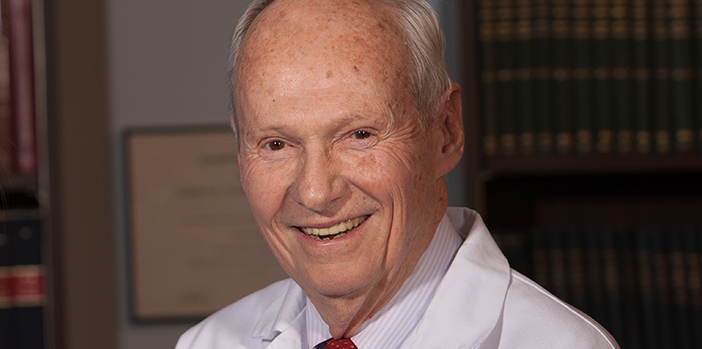When people describe Chuck Carpenter as a “giant,” they’re not referring to his tall, slender frame. They’re describing another kind of stature: his legacy as both a clinician and a pioneering infectious diseases researcher. Here, his colleagues remember their mentor, teacher, and friend.
Dr. Carpenter taught us that the patient comes first, always, and that taking care of patients is a privilege that needs to be respected. His patients often referred to him as the “gentle giant” given his empathetic and caring bedside manner. I learned so much from Dr. Carpenter in those early years about what it means to be a physician.
CURT G. BECKWITH MD’99 RES’03 F’05
Associate Professor of Medicine
Division of Infectious Diseases
Dr. Carpenter loved and exemplified academic medicine. He believed well-designed clinical research was the best way to advance science. He was dedicated to teaching medicine. And compassionate patient care was at the heart of it all.
The early days of the HIV epidemic were sobering. CCJC made it his mission to seek out and be the personal physician for every woman with HIV who reached out to him. He went to visit many newly diagnosed patients at our state prison. He wanted each and every one of them to know that they had their own personal doctor who would treat them with TLC. He cared for many of these patients right to the end and was at their bedside when they passed away.
Today, when I’m in a pickle and wondering how to tackle a tough situation, I try to imagine the advice Dr. Carpenter would give me. And then go to it!
TIMOTHY P. FLANIGAN, MD
Professor of Medicine
Division of Infectious Diseases
Chuck’s greatest legacy is the large number of academic physicians he trained and who have become prominent leaders in their fields. His clinical acumen was accompanied by an extraordinarily true moral compass. All remember their interactions with him as being focused on the best interests of the patients. His commitment to patient care made him a mentor and teacher who taught by his actions. Throughout the country, indeed throughout the world, there are still scores of physicians who ground themselves when confronted by difficult clinical scenarios by saying “What would Chuck do?”
LOUIS B. RICE, MD
Joukowsky Family Professor and Chair, Department of Medicine
I was trained in ob/gyn. Dr. Carpenter convinced me to do a fellowship in HIV and AIDS for three years. AIDS was a disease of gay men. Everybody was dying. And women who had HIV were not supposed to get pregnant. What career option was there for an ob/gyn when you’re dealing with people who should not have babies and who will be dead in their 30s? But Dr. Carpenter was such a visionary and so optimistic that he said, “They’re dying now, but we are going to do something about this.”
I credit him for my whole career. We are all his mentees. Without him, none of us would be here. He trained us to be the next generation, as we are now training the next generation.
SUSAN CU-UVIN, MD
Director, Providence/Boston CFAR
Founding director of the nation’s first HIV Menopause Clinic
In 2004, when I was a postdoc at Stanford and considering whether I should accept the invitation to interview at Brown for an ID fellowship, I vividly remember that as soon as I saw Dr. Carpenter’s picture and CV there, I knew that this was the place for me. I was inspired by him even before I met him, and so much more after I did and ever since. He had the rare combination of being nice, smart, respected, respectful, critical, supportive, pleasant, and inspiring. He always asked and cared about everyone, in a truthful, supportive, and hugely appreciated way. Dr. Carpenter’s historic role in our CFAR will always be here with us, will always inspire us, and will always lead the way and guide our actions.
RAMI KANTOR F’07, MD
Professor of Medicine
Director of Research, Brown University-Kenya Program
Director, The Miriam Hospital HIV Drug Resistance Laboratory
Dr. Carpenter was a big supporter of our Core and the use of principled statistical methods for understanding HIV. Having this kind of support from a clinician scientist of his stature made a major difference for our Core, and I believe it played a role in elevating it in the world of CFARs.
JOSEPH W. HOGAN, ScD
Carole and Lawrence Sirovich Professor of Public Health
Brown School of Public Health
Dr. Carpenter was such an important part of my life at a time when I needed it the most. His confidence in me and my abilities helped me grow to be the person I am today. His respect for my opinions transferred to others around him and allowed me to succeed. He was a giant in his field (which I only heard from others, as he was always so modest), a respected leader, and most important, a caring and thoughtful friend.
VICKI GODLESKI
Administrative Director, Providence/Boston CFAR
Our sadness is profound as we try to process the loss of such a friend, teacher, mentor, and father figure. From fighting cholera in India, to helping treat both the stigma and the virus of HIV, Chuck dedicated his life to his patients and to the most vulnerable members of our society. He did his most effective teaching by example, and his commitment to patients will be the most profound memory of the precious time we spent in his presence. We hope we have some of his strength, and use his example as our compass as we get ready for the coming storm.
ELEFTHERIOS MYLONAKIS, MD
Charles C. J. Carpenter Professor of Infectious Diseases
Chief, Division of Infectious Diseases
The Miriam and Rhode Island hospitals




